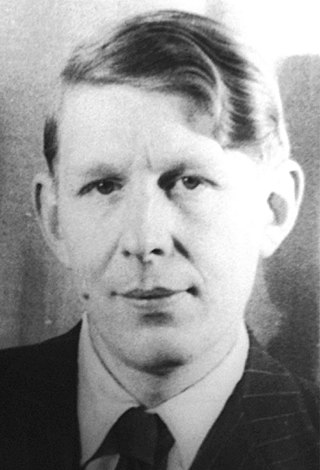
Wystan Hugh Auden was a British-American poet. Auden's poetry is noted for its stylistic and technical achievement, its engagement with politics, morals, love, and religion, and its variety in tone, form, and content. Some of his best known poems are about love, such as "Funeral Blues"; on political and social themes, such as "September 1, 1939" and "The Shield of Achilles"; on cultural and psychological themes, such as The Age of Anxiety; and on religious themes, such as "For the Time Being" and "Horae Canonicae".

Edward Benjamin Britten, Baron Britten was an English composer, conductor, and pianist. He was a central figure of 20th-century British music, with a range of works including opera, other vocal music, orchestral and chamber pieces. His best-known works include the opera Peter Grimes (1945), the War Requiem (1962) and the orchestral showpiece The Young Person's Guide to the Orchestra (1945).

Christopher William Bradshaw Isherwood was an Anglo-American novelist, playwright, screenwriter, autobiographer, and diarist. His best-known works include Goodbye to Berlin (1939), a semi-autobiographical novel which inspired the musical Cabaret (1966); A Single Man (1964), adapted as a film by Tom Ford in 2009; and Christopher and His Kind (1976), a memoir which "carried him into the heart of the Gay Liberation movement".

Frederick Louis MacNeice was an Irish poet, playwright and producer for the BBC. His poetry, which frequently explores themes of introspection, empiricism, and belonging, is considered to be among the greatest of twentieth century literature. Despite being renowned as a member of the Auden Group, he was also an independently successful poet with an influential body of work, which is replete with themes ranging from faith to mortality. His body of work was appreciated by the public during his lifetime, due in part to his relaxed but socially and emotionally aware style. Never as overtly or simplistically political as some of his contemporaries, he expressed a humane opposition to totalitarianism as well as an acute awareness of his roots.
The Downs Malvern is a private prep school in the United Kingdom, founded in 1900. It is located on a 55-acre (22 ha) site in Colwall in the County of Herefordshire, on the western slopes of the Malvern Hills. The school takes children aged 2 to 13 and comprises a nursery, kindergarten, pre-prep, and preparatory school; the preparatory school takes both day students and boarders. The Headmaster since 2009 has been Alastair Cook, who is a member of the Boarding Schools Association and the IAPS. Fees are currently up to £21,471 pa for full boarders and up to £16,221 pa for day pupils.

Paul Bunyan, Op 17, is an operetta in two acts and a prologue composed by Benjamin Britten to a libretto by W. H. Auden, designed for performance by semi-professional groups. It premiered at Columbia University on 5 May 1941, to largely negative reviews, and was withdrawn by the composer. Britten revised it somewhat in 1976 and it has subsequently had numerous performances and two commercial recordings. The story is based on the folkloric American lumberjack, Paul Bunyan, with the music incorporating a variety of American styles, including folk songs, blues and hymns. The work is strongly sectional in nature, highly reminiscent of the 'Broadway musical' style of the period.
John Sleigh Pudney was a British poet, journalist and author. He was known especially for his popular poetry written during the Second World War, but he also wrote novels, short stories and children's fiction. His broad-ranging non-fiction, often commissioned, served as his primary source of income.

Hymn to St Cecilia, Op. 27 is a choral piece by Benjamin Britten (1913–1976), a setting of a poem by W. H. Auden written between 1940 and 1942. Auden's original title was "Three Songs for St. Cecilia's Day", and he later published the poem as "Anthem for St. Cecilia’s Day ".
"Funeral Blues", or "Stop all the clocks", is a poem by W. H. Auden which first appeared in the 1936 play The Ascent of F6. Auden substantially rewrote the poem several years later as a cabaret song for the singer Hedli Anderson. Both versions were set to music by the composer Benjamin Britten. The second version was first published in 1938 and was titled "Funeral Blues" in Auden's 1940 Another Time. The poem experienced renewed popularity after being read in the film Four Weddings and a Funeral (1994), which also led to increased attention on Auden's other work. It has since been cited as one of the most popular modern poems in the United Kingdom.

Rejoice in the Lamb is a cantata for four soloists, SATB choir and organ composed by Benjamin Britten in 1943 and uses text from the poem Jubilate Agno by Christopher Smart (1722–1771). The poem, written while Smart was in an asylum, depicts idiosyncratic praise and worship of God by different things including animals, letters of the alphabet and musical instruments. Britten was introduced to the poem by W. H. Auden whilst visiting the United States, selecting 48 lines of the poem to set to music with the assistance of Edward Sackville-West. The cantata was commissioned by the Reverend Walter Hussey for the celebration of the 50th anniversary of the consecration of St Matthew's Church, Northampton. Critics praised the work for its uniqueness and creative handling of the text. Rejoice in the Lamb has been arranged for chorus, solos and orchestral accompaniment, and for SSAA choir and organ.

The Shield of Achilles is a poem by W. H. Auden first published in 1952, and the title work of a collection of poems by Auden, published in 1955. It is Auden's response to the detailed description, or ekphrasis, of the shield borne by the hero Achilles in Homer's epic poem the Iliad.

Night Mail is a 1936 British documentary film directed and produced by Harry Watt and Basil Wright, and produced by the General Post Office (GPO) Film Unit. The 24-minute film documents the nightly postal train operated by the London, Midland and Scottish Railway (LMS) from London to Scotland and the staff who operate it. Narrated by John Grierson and Stuart Legg, the film ends with a "verse commentary" written by W. H. Auden to a score composed by Benjamin Britten. The locomotive featured in the film is LMS Royal Scot Class 6115 Scots Guardsman.

Poems is the title of three separate collections of the early poetry of W. H. Auden. Auden refused to title his early work because he wanted the reader to confront the poetry itself. Consequently, his first book was called simply Poems when it was printed by his friend and fellow poet Stephen Spender in 1928; he used the same title for the very different book published by Faber and Faber in 1930, and by Random House in 1934, which also included The Orators and The Dance of Death.
Elizabeth Wolff Mayer was a German-born American translator and editor, closely associated with W. H. Auden, Benjamin Britten, Peter Pears, and other writers and musicians. After emigrating to the United States in the 1940s she used her homes in Long Island and New York City as salons for visiting artists.

Letters from Iceland is a travel book in prose and verse by W. H. Auden and Louis MacNeice, published in 1937.

On This Island is a book of poems by W. H. Auden, first published under the title Look, Stranger! in the UK in 1936, then published under Auden's preferred title, On this Island, in the US in 1937. It is also the title of one of the poems in the collection.

The Double Man is a book of poems by W. H. Auden, published in 1941. The title of the UK edition, published later the same year was New Year Letter.
"The Sea and the Mirror: A Commentary on Shakespeare's The Tempest" is a long poem by W. H. Auden, written 1942–44, and first published in 1944. Auden regarded the work as "my Ars Poetica, in the same way I believe The Tempest to have been Shakespeare's."
This is a bibliography of books, plays, films, and libretti written, edited, or translated by the Anglo-American poet W. H. Auden (1907–1973). See the main entry for a list of biographical and critical studies and external links. Dates are dates of publication of performance, not of composition.












